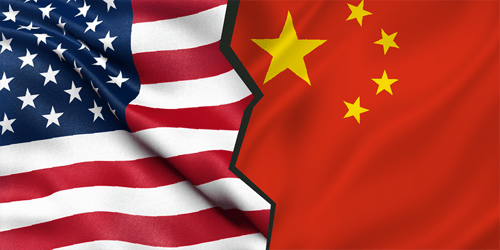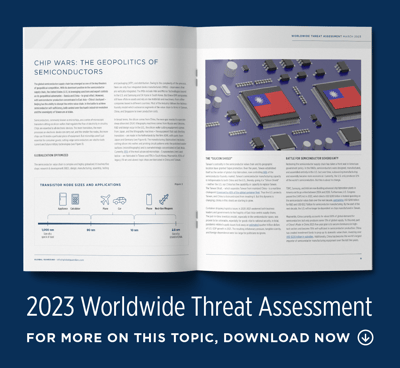As tensions continue to escalate between the United States and China, business leaders of multinational corporations are navigating the implications of this decoupling and what happens if China invades Taiwan.

In a memo leaked in late January, Air Force Gen. Michael Minihan warned troops under his command that a war between the United States and China could occur in just two years. Minihan cited Chinese President Xi Jinping's growing political ambitions as well as upcoming presidential elections in the U.S. and Taiwan in 2024, both of which could potentially reshape geopolitics in the East China Sea, and in turn, the entire globe.
 China and the Indo-Pacific region comprise a significant cross-section of U.S. business and trade. However, repeated warnings from U.S. military and civilian leaders, along with a recent string of diplomatic incidents, have highlighted the degree of geopolitical and geoeconomic tension between the U.S. and China. Indeed, Sino-American relations are poised to further deteriorate as China mulls its response options to U.S. export controls on microchips and expanding its military support to Russia. Multinationals occupy a highly compromised position—caught between both governments—in this opening phase of new Cold War. In light of this risk, it is imperative that U.S. companies operating in or even companies with exposure to mainland China and Taiwan to formulate both immediate and long-term strategies and contingency plans in order to protect their employees, business assets, and ultimately, their bottom lines. The writing is on the wall, the decoupling of “Chimerica” is not a matter of if but when. So, what are companies to do?
China and the Indo-Pacific region comprise a significant cross-section of U.S. business and trade. However, repeated warnings from U.S. military and civilian leaders, along with a recent string of diplomatic incidents, have highlighted the degree of geopolitical and geoeconomic tension between the U.S. and China. Indeed, Sino-American relations are poised to further deteriorate as China mulls its response options to U.S. export controls on microchips and expanding its military support to Russia. Multinationals occupy a highly compromised position—caught between both governments—in this opening phase of new Cold War. In light of this risk, it is imperative that U.S. companies operating in or even companies with exposure to mainland China and Taiwan to formulate both immediate and long-term strategies and contingency plans in order to protect their employees, business assets, and ultimately, their bottom lines. The writing is on the wall, the decoupling of “Chimerica” is not a matter of if but when. So, what are companies to do?
"The writing is on the wall, the decoupling of 'Chimerica' is not a matter of if but when. So, what are companies to do?"
IMplications of Decoupling
First and foremost, companies with a presence in mainland China and Taiwan must prepare for the downstream implications of strategic decoupling between American and Chinese industries. The second- and third-order ramifications of a new Cold War would complicate access to the Chinese market and raw materials, put limitations on investment flows, and business travel, and possibly lead to forced asset seizures.
Admittedly, the full impact of decoupling on U.S. business is unlikely to materialize in the immediate term, especially as the reopening of China’s economy following years of strict “zero COVID” measures promises to revitalize economic activity in the region. However, the continued deterioration of U.S.-China relations could dramatically increase the risk of a crisis or even an armed conflict—one that would overturn the entire economic order almost overnight. This is a reality that business leaders know all too well; hundreds of companies suspended or withdrew their operations in Russia last year in response to its invasion of Ukraine.
"...the continued deterioration of U.S.-China relations could dramatically increase the risk of a crisis or even an armed conflict—one that would overturn the entire economic order almost overnight."
Ultimately, decision makers need to answer the question of how they would protect their enterprises and employees in the event of a major regional crisis, putting decoupling into overdrive, within the next two to five years.
Preparing for all outcomes
To formulate an effective threat response plan in the short term, companies should start by conducting an audit of their operations and personnel presence in mainland China and Taiwan. That means determining which employees and business assets are essential to their enterprise and whether they can be moved out of the region safely and effectively in the event of a crisis.
In particular, companies should reconsider the timeline for expats and their families who currently live in China and Taiwan. Although it’s common to relocate expats and their families for multiple-year rotations—a practice that also includes benefits such as education for their children—it is vital that companies reduce their expat footprint amid a more complex threat landscape in the region.
However, making the appropriate determinations and creating the right plans for employees are just the first steps. It is also crucial that companies simulate models and conduct regular table-top exercises. These practices are vital to deciphering the best- and worst-case scenarios, as well as preparing for any outcomes that fall along that continuum.
Making the hard Decisions

In response to escalation from Beijing, including President Xi’s recent warning to the U.S. over interference in Taiwan, more and more companies operating in the region are starting to prepare accordingly. At Global Guardian, our partnerships with Fortune 1000 companies have recently included table-top exercises and modeling scenarios in preparation of a potential conflict in Taiwan.
"East Asia will be the focal point of the next epoch-defining geopolitical crisis."
In the long term, companies must be prepared to shift their operations out of mainland China or Taiwan entirely. A number of prominent companies such as Google and Apple have embarked on this process in recent months, moving factories from China to Vietnam due to concerns about geopolitical risk and China’s COVID-Zero policy. In the event of a crisis, companies that formulate such contingencies will be better positioned to shift critical infrastructure and assets out of the region or pivot their manufacturing and product base to another location.
East Asia will be the focal point of the next epoch-defining geopolitical crisis. To address this very real threat, companies with a business presence in mainland China and Taiwan must take steps now to adapt and prepare. By developing a cohesive plan that accounts for all potential threats in the short- and long-term, and considering partnerships with duty of care providers, business leaders can build confidence within their workforces and enterprises and ensure they are prepared for any scenario that may arise.
STANDING BY TO SUPPORT
Global Guardian is actively supporting global businesses with personnel and assets in Taiwan and China with business resiliency assessments, contingency and emergency response planning, and tabletop exercises. To learn more, complete the form to contact Global Guardian's 24/7 Operations Center or call us directly at +1 (703) 566-9463.



